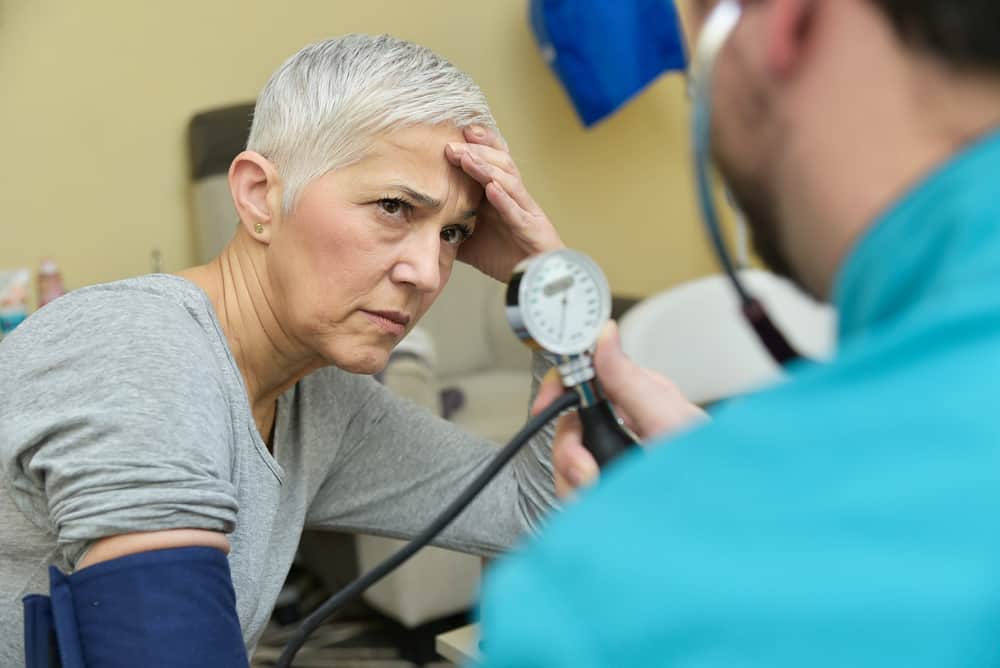Does menopause have you feeling like a constant hot and sweaty mess? As if the hot flushes weren’t hard enough to deal with, you have to keep an eye out for other menopause-related side effects.
Menopause is a naturally occurring process that signals the shutting down of a woman’s reproductive system, usually occurring in women between the ages of 40-55. With age and menopause, your ovary function and hormone production decrease.
With these changes and hormonal imbalances, it can take a while for your body to adjust. These hormone changes can affect the endocrine system and cause hypertension (high blood pressure).
The risk of hypertension is increased if hormone replacement therapy (HRT) is required for the management of menopause. Changes in hormone levels can also mean that your blood pressure is more affected by the level of sodium, calcium and caffeine in your diet.

Main Topics
Signs & Symptoms
Unless you have a sudden or substantial increase in blood pressure, you may not notice the change without using a blood pressure monitor.
Signs that could indicate an extreme increase in blood pressure are intense headaches, nosebleeds, blurred vision, difficulty breathing, chest pain and/or throbbing in your head, eyes, neck, and ears.
If you have any of these symptoms, you should contact your GP surgery straight away. If not treated, extreme hypertension can lead to strokes and heart attacks and can be life-threatening.
Diagnosis
The first step to take if you think your blood pressure may be higher than normal is to check your blood pressure with a monitor. This can be done at home with a monitor you purchase yourself or at a GP’s surgery.
Monitors are useful to have and are inexpensive. This would be ideal if you have a close relative with high blood pressure as you can monitor your readings regularly.
These are widely available online and in pharmacies and are user-friendly. If your blood pressure is raised, it is worth then making an appointment with your doctor to discuss managing it.
Non-medical Treatment
Before suggesting medication for treating high blood pressure, your doctor may advise that you change your lifestyle. Staying physically active and eating healthy both contribute to controlling blood pressure increases.
If you can maintain healthy body weight, it will go a long way to help you with your blood pressure and other medical issues.
Try and eat plenty of vegetables, whole grains, and fruits, and reduce the amount of fast food and salt in your diet. It is also beneficial if you can quit smoking, limit caffeine, and limit your alcohol consumption.
Stress can also lead to an increase in blood pressure. Identify your stress factors and see if there is a way of reducing the levels caused to you. Meditation, mindfulness exercises, and regular exercise can help you manage your stress levels.
Medical Treatment
If you are finding that your blood pressure is still high after altering your lifestyle, you may need to try medication. The difficulty is that not all medications work as well for everyone.
It could take a while to find the right one for you and you may have to try a combination of medications. You will likely need to undergo further testing to narrow down which factors are causing the rise in your blood pressure.
Medications vary in the way they work from expelling excess sodium from your body to making the heartbeat less forcefully. Some of the medications the doctor can prescribe are diuretics, alpha/beta-blockers, ACE inhibitors, calcium channel blockers, and angiotensin II receptor blockers.
As with any medication, there may be additional risks and side effects so be sure to ask your doctor about these before starting your treatment. Also, ask your doctor about any signs to look out for and when to stop taking the medication pending review.
Frequently Asked Questions
What is a normal blood pressure reading?
Typically, a ‘perfect’ blood pressure reading is around 120/80 mm Hg. The top number is the systolic reading and the bottom number is the diastolic reading.
The systolic reading can be between 110 and 130 for a healthy adult and not cause concern. However, if the systolic blood pressure reading is above 120 over a sustained amount of time, with a diastolic reading of below 80, this would be considered as a high reading.
Some people have lower or higher blood pressure readings as their normal. It is a good idea to always have an understanding of what is normal for you.
If you have a close relative with a history of high blood pressure, invest in an at-home blood pressure monitor to ensure that you can check yours regularly.
Would I know if I have high blood pressure?
You may have high blood pressure and not even know it. For about 30% of sufferers, there are no symptoms. Most symptoms associated with high blood pressure only occur if it is severely high.
It is important to have your blood pressure checked regularly and know what is ‘normal’ for you.
Will high blood pressure go back to normal after menopause?
Hot flushes, hormone imbalances, and hormone replacement therapy can all cause your blood pressure to be raised. These factors do level out after menopause but you still should keep an eye on your readings regularly.
Following a healthy diet and maintaining a healthy weight will help you keep your blood pressure down. Exercise and stress management will also help you to lower your blood pressure. If these methods do not control your blood pressure, you may be better off talking to your doctor about medicinal options.
Are there any non-medicinal ways to lower blood pressure?
If you can control your blood pressure through lifestyle changes, you can avoid or at least delay the need for medication. It does take dedication and great change on your part but it may mean you won’t be dependent on medications.
However, some sufferers have found that these changes alone cannot keep their blood pressure under control.
Leave a Reply